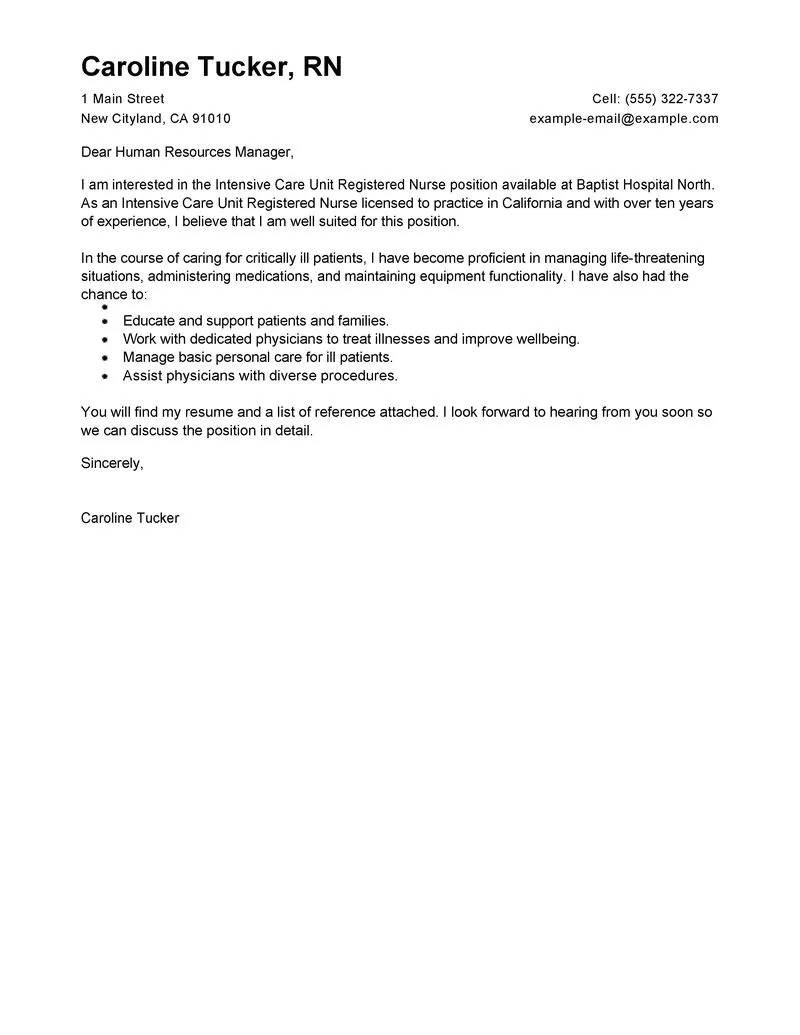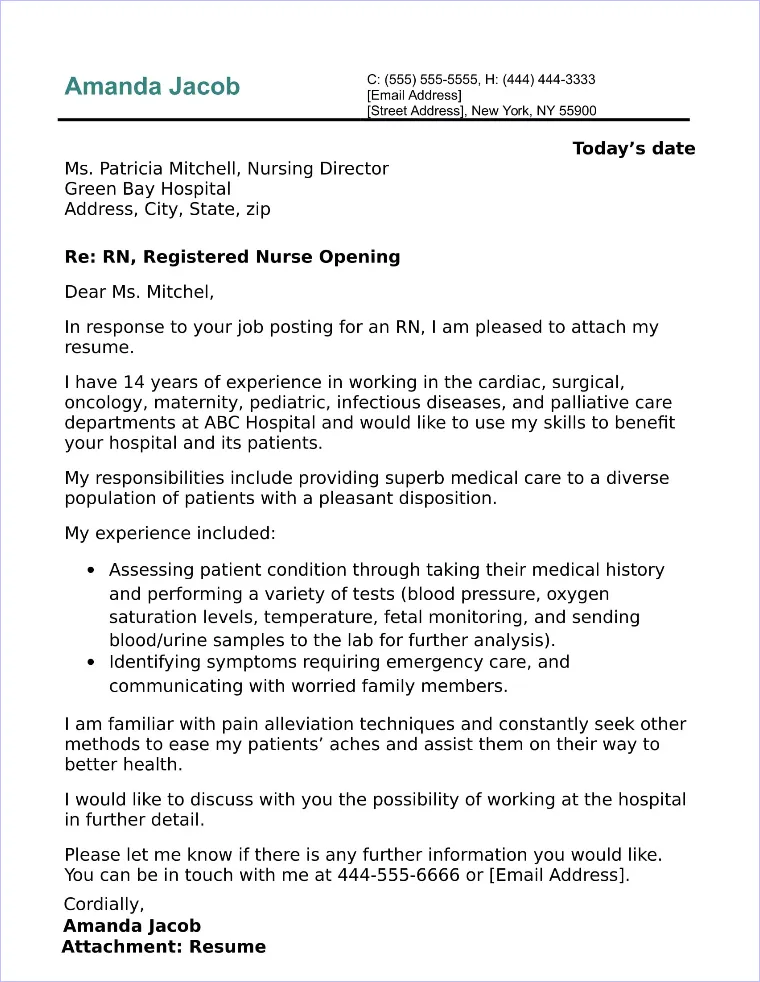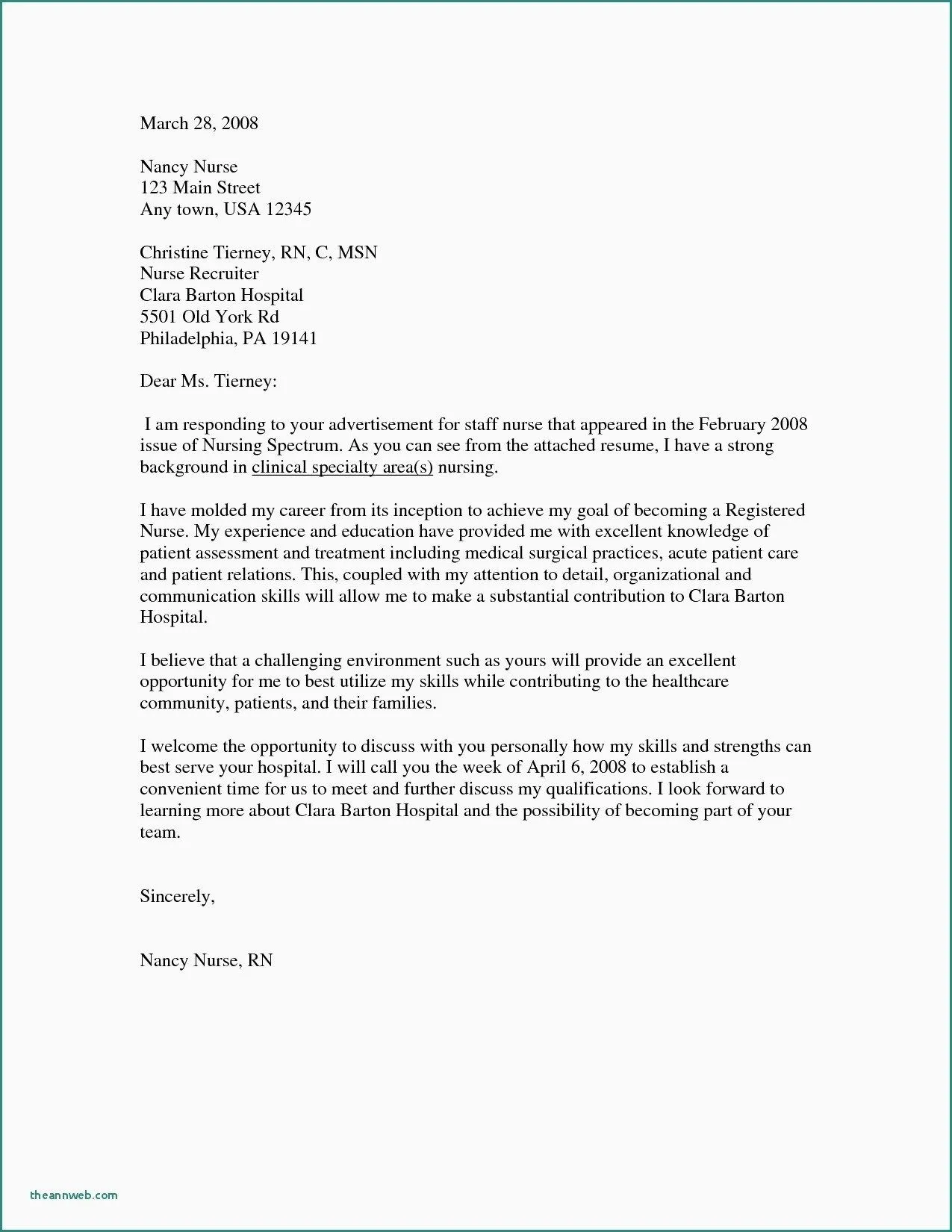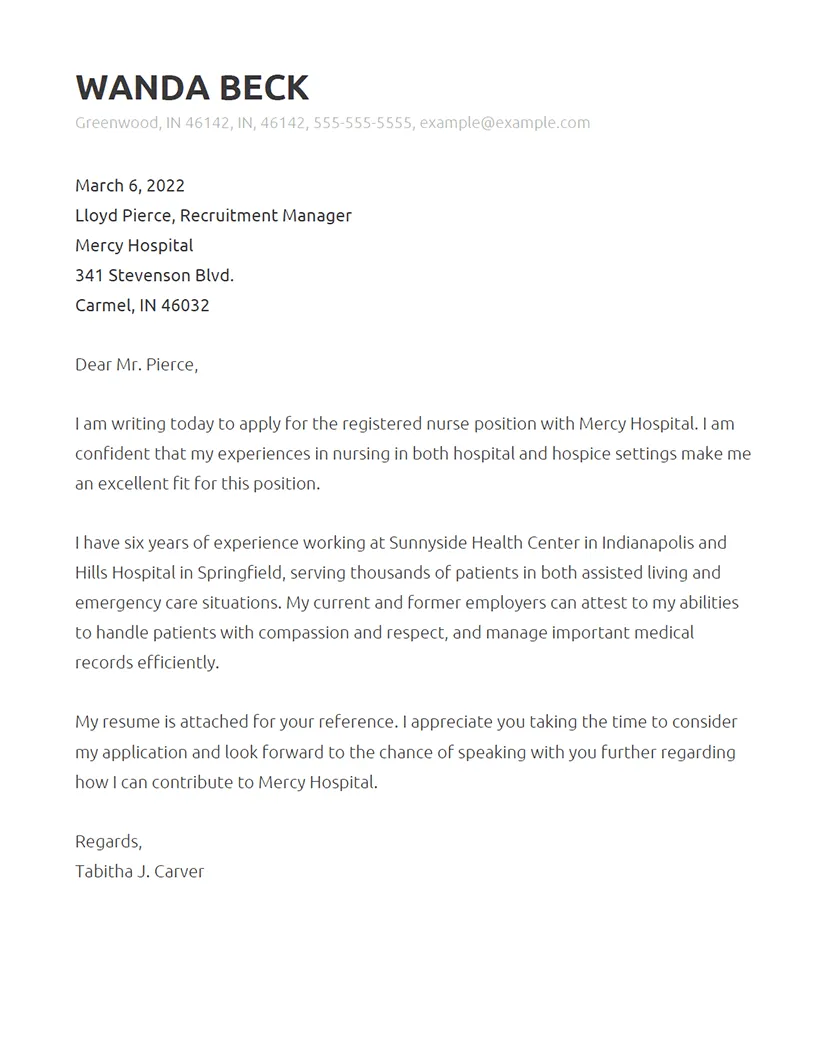Why a Stellar RN Cover Letter Matters
In the competitive world of healthcare, a Registered Nurse (RN) cover letter is your first impression. It’s not just a formality; it’s a crucial tool that can significantly impact your chances of landing an interview. A well-crafted cover letter goes beyond simply restating your resume. It allows you to showcase your personality, highlight your unique skills and experiences, and demonstrate your genuine interest in the specific position and the healthcare organization. Think of it as your personal introduction, providing the hiring manager with a glimpse into your qualifications and aspirations. Without a compelling cover letter, your application might get lost in the shuffle, overlooked by recruiters who are sifting through numerous candidates. A strong cover letter increases your chances of being selected for an interview and ultimately getting the job. It is also a great opportunity to show that you have understood the job description and can fulfil the needs of the employer. Therefore, investing time and effort into writing a stellar RN cover letter is a worthwhile investment in your career.
Key Elements of a Strong RN Cover Letter
A successful RN cover letter includes several key elements that work together to create a compelling narrative. It should start with a professional header, including your contact information. The body of the letter should open with a strong and engaging introduction, immediately grabbing the reader’s attention. The next sections should highlight your relevant skills, experience, and certifications, aligning them with the job requirements. Quantify your achievements using data and specific examples to demonstrate your value. Tailor your letter to the specific job, showing that you’ve researched the employer and understand their needs. Conclude with an enthusiastic closing, reiterating your interest and including a call to action. Finally, meticulously proofread and edit your cover letter to eliminate any errors. By incorporating these elements, you create a cover letter that is informative, persuasive, and tailored to each specific job. This will dramatically increase your chances of making a positive impression and securing an interview.
Formatting Your RN Cover Letter

Proper formatting is essential for a professional and readable RN cover letter. Your cover letter should be easily readable. Stick to a standard font, such as Times New Roman, Arial, or Calibri, in a size between 11 and 12 points. Use single-spacing for the body of the letter and leave a space between each paragraph to improve readability. Maintain consistent margins (typically 1 inch on all sides) to create a clean and balanced look. Use a formal business letter format, including the date, the hiring manager’s name and title (if known), and the company’s address. Keep the tone professional and concise. Avoid lengthy paragraphs; aim for short, impactful sentences and paragraphs. A well-formatted cover letter demonstrates attention to detail and professionalism, presenting you in the best possible light to the hiring manager. By following these guidelines, you ensure your cover letter looks polished and easy to read, leaving a positive impression on the recruiter or hiring manager.
Header and Contact Information
Begin your RN cover letter with a professional header that includes your full name, address, phone number, and email address. This information should be clearly displayed at the top left or right corner of the letter. Use a professional-sounding email address; avoid using nicknames or unprofessional addresses. Next, include the date, followed by the hiring manager’s name and title (if you know it) and the company’s address. If you are applying online and don’t know the hiring manager’s name, research the company website, or address the letter to the ‘Hiring Manager’ or ‘Recruiting Team.’ Accuracy in the header demonstrates attention to detail and professionalism, setting a positive tone for the rest of the letter. Make sure all your contact information is current and accurate so that the employer can easily reach you if they wish to move forward with your application.
Greeting the Hiring Manager
The greeting in your RN cover letter should be professional and personalized. If you know the hiring manager’s name, use a formal greeting such as ‘Dear Mr./Ms./Dr. [Last Name].’ This shows you’ve taken the time to research the company and personalize your application. If you cannot find the hiring manager’s name, use a more general greeting, such as ‘Dear Hiring Manager’ or ‘Dear [Department Name] Recruiting Team.’ Avoid using informal greetings like ‘Hello’ or ‘Hi.’ The greeting sets the tone for your entire letter; it’s important to strike the right balance between professionalism and warmth. Use the correct title (Mr., Ms., Dr., etc.) to show respect. Always double-check the spelling of the hiring manager’s name to avoid errors, as such errors can undermine your professional image. A well-crafted greeting immediately establishes a respectful and professional rapport, encouraging the reader to continue reading your letter.
Writing a Compelling Opening Paragraph

Your opening paragraph is your first opportunity to capture the hiring manager’s attention. It should immediately state the position you are applying for and how you found the job opening. Briefly mention your most relevant qualification or accomplishment. Instead of a generic opening, start with an impactful statement that highlights your enthusiasm and aligns with the job requirements. Consider mentioning a specific skill or experience that directly matches the job description. For example, you might mention your experience with a particular patient population, specialized procedures, or a significant achievement in a previous role. Keep the opening concise and to the point, ideally within 3-4 sentences. The goal is to make the hiring manager want to read more. A strong opening paragraph sets a positive tone and encourages the reader to continue reviewing your application.
Highlighting Your Nursing Skills and Experience
In the body of your RN cover letter, focus on highlighting your nursing skills and experience that align with the job requirements. Review the job description carefully and identify the key skills and experiences the employer is seeking. Provide specific examples that demonstrate your abilities. Use the STAR method (Situation, Task, Action, Result) to structure your responses. Describe a situation where you utilized a specific skill, explain the task you were assigned, detail the action you took, and highlight the positive results of your efforts. For example, if the job requires experience with electronic health records (EHR) systems, mention your proficiency in using the specific EHR system used by the employer. Provide concrete examples of patient care, teamwork, and critical thinking. Avoid simply listing your skills; instead, illustrate them through compelling narratives. This will show the hiring manager that you possess the required skills and the ability to apply them effectively in a real-world environment. Use the language from the job description to show you have carefully read the job posting.
Showcasing Relevant Skills and Certifications
Clearly showcase your relevant skills and certifications in your RN cover letter to demonstrate your qualifications. List the essential skills highlighted in the job description, such as patient assessment, medication administration, wound care, and electronic health records (EHR) proficiency. Include any specialized certifications that align with the job requirements, such as Advanced Cardiovascular Life Support (ACLS), Pediatric Advanced Life Support (PALS), or certifications in specific nursing specialties. Provide brief details about each certification, including the issuing organization and the date of expiration (if applicable). Mention any additional skills that could be beneficial, such as leadership, communication, or teamwork skills. This section provides quick and easy access to the relevant certifications needed for the RN position, helping the hiring manager quickly assess your qualifications. By listing the relevant skills and certifications, you can quickly demonstrate that you meet the necessary criteria and increase your chances of getting an interview.
Quantifying Achievements in Your Cover Letter

Quantifying your achievements is a powerful way to demonstrate the value you bring to a nursing position. Use numbers and data to provide concrete evidence of your accomplishments. Instead of saying, “Improved patient satisfaction,” say, “Improved patient satisfaction scores by 15% through implementing a new communication protocol.” Whenever possible, include metrics that showcase your success in previous roles. Examples include the number of patients you’ve cared for, the percentage of reduced medication errors, or the positive impact you made on patient outcomes. Use numbers to illustrate your impact. For instance, ‘Successfully managed a unit of 20 patients daily, ensuring optimal care and minimal adverse events.’ Quantifiable achievements make your cover letter more persuasive and provide concrete evidence of your skills and abilities. By providing specific, measurable results, you make it easy for the hiring manager to understand the value you can bring to the role. Therefore, quantify your accomplishments to make your cover letter stand out and show how you have contributed to the success of previous employers.
Tailoring Your Cover Letter to the Job
Tailoring your cover letter to each specific job is crucial for demonstrating your genuine interest and suitability for the role. Avoid using a generic cover letter; customize it to reflect the specific requirements and expectations of each position. Review the job description carefully and identify the key skills, experience, and qualifications the employer is seeking. Highlight the specific skills, experiences, and certifications that match the job requirements. Demonstrate your understanding of the company’s mission, values, and culture. Do your research. Mention any specific projects, initiatives, or areas of interest that align with the organization’s goals. Show how your skills and experience can contribute to their success. The more relevant you make your cover letter to the specific job, the more likely you are to capture the hiring manager’s attention. Customize your cover letter to demonstrate that you have taken the time to understand the role and how you can contribute to the success of the organization.
Expressing Your Enthusiasm and Fit
Expressing your enthusiasm for the position and demonstrating that you are a good fit for the organization is essential. Show genuine interest in the job and the employer by mentioning why you are excited about this specific opportunity. Express your enthusiasm by highlighting what attracts you to the organization. Mention what you find appealing about their mission, values, or culture. Explain why you are particularly interested in this position, and how it aligns with your career goals and aspirations. If you have a passion for a particular area of nursing that aligns with the role, mention it. Your enthusiasm will make a positive impression and help you stand out. The more enthusiastic you are, the more compelling your application becomes. Expressing genuine enthusiasm and demonstrating how your values align with the company’s will help you get noticed.
Writing a Powerful Closing

Your closing paragraph should be concise, enthusiastic, and action-oriented. Reiterate your interest in the position and express your confidence in your ability to contribute. Include a call to action, such as stating that you are available for an interview at their earliest convenience. Thank the hiring manager for their time and consideration. Reiterate your contact information for ease of access. Ensure your closing paragraph leaves a positive and lasting impression, encouraging the hiring manager to take the next step. A well-crafted closing paragraph is your final opportunity to make a strong impression. End with a professional closing, such as ‘Sincerely’ or ‘Best regards,’ followed by your full name. Ensure your closing is concise, impactful, and leaves a positive impression on the reader, increasing your chances of receiving an interview invitation.
Proofreading and Editing Your Cover Letter
Before submitting your RN cover letter, meticulously proofread and edit it to eliminate any errors. Errors can undermine your credibility and create a negative impression. Check for grammar, spelling, punctuation, and formatting errors. Read your cover letter multiple times, and consider asking a friend, colleague, or career advisor to review it for a fresh perspective. Ensure your sentences are clear, concise, and easy to understand. Avoid using jargon or overly complex language. Verify all contact information. Correct any inconsistencies in formatting. Proofreading and editing are essential steps in creating a polished and professional cover letter. A well-proofread cover letter demonstrates attention to detail and professionalism. A cover letter free of errors will ensure that you make a strong first impression on the hiring manager and increase your chances of securing an interview.
Common Mistakes to Avoid in Your RN Cover Letter
Avoid common mistakes to ensure your RN cover letter stands out. One of the biggest mistakes is using a generic cover letter that is not tailored to the specific job. Ensure you tailor the letter to each specific application. Avoid using the same cover letter for every job application. Do not simply restate your resume. Highlight your key skills and experiences. Avoid grammar, spelling, and punctuation errors. Ensure all your information is accurate and professional. Do not include irrelevant information. Focus on the skills and experiences that are most relevant to the job. Refrain from negative language or complaints. Be positive and enthusiastic. Avoid being too casual in your tone. Maintain a professional tone throughout your letter. By avoiding these common mistakes, you can create a compelling RN cover letter that effectively showcases your skills, experience, and enthusiasm, significantly increasing your chances of getting an interview.
